As the new semester is about to start next week for our postgraduate students, I thought it may be appropriate to note an interesting personal link between competition law (maybe even international competition law and free trade) and the Erasmus programme.
The Erasmus programme was initiated in the mid-1980s. The ‘education’ portfolio in the European Commission was then—only for one year— managed by Peter Sutherland, the Competition Commissioner. During that short period, in 1986, Sutherland proposed and subsequently launched the Erasmus initiative, earning the unofficial title of the ‘father of Erasmus’. In fact, creation of the Erasmus programme was the policy initiative Sutherland was most proud of.
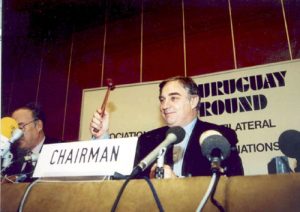 Peter Sutherland was Attorney General of Ireland from 1981 until 1984. Subsequently he became the youngest ever European Commissioner, looking after the competition portfolio from 1985 until 1989. Later on he became the founding Director-General of the World Trade Organization, from 1993 until 1995. Due to his leadership in the latter role he was often referred to as the ‘father of globalization’. In fact, Sutherland served as the chairman during the Uruguay round of trade negotiations leading to the creation of the WTO (photo: WTO website). These successful trade talks largely dealt with public barriers to trade—putting private barriers to trade in the limelight and making competition legislation only more relevant, contributing to its spread internationally.
Peter Sutherland was Attorney General of Ireland from 1981 until 1984. Subsequently he became the youngest ever European Commissioner, looking after the competition portfolio from 1985 until 1989. Later on he became the founding Director-General of the World Trade Organization, from 1993 until 1995. Due to his leadership in the latter role he was often referred to as the ‘father of globalization’. In fact, Sutherland served as the chairman during the Uruguay round of trade negotiations leading to the creation of the WTO (photo: WTO website). These successful trade talks largely dealt with public barriers to trade—putting private barriers to trade in the limelight and making competition legislation only more relevant, contributing to its spread internationally.
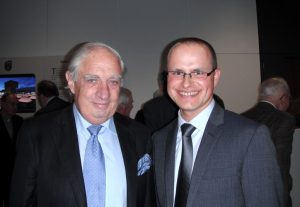 I had the pleasure of meeting Peter Sutherland in 2011, during my doctoral studies in competition law at University College Dublin (hence the attached photo). Sutherland made a substantial leadership gift to UCD and the Law School at UCD, my doctoral alma mater, carries now his name.
I had the pleasure of meeting Peter Sutherland in 2011, during my doctoral studies in competition law at University College Dublin (hence the attached photo). Sutherland made a substantial leadership gift to UCD and the Law School at UCD, my doctoral alma mater, carries now his name.
Peter Sutherland passed away in January 2018.
PS: Peter Sutherland was also linked with Queen’s University. In 2003 he was awarded an honorary degree of Doctor of Science (Economics) by our University.




 Peter Sutherland was Attorney General of Ireland from 1981 until 1984. Subsequently he became the youngest ever European Commissioner, looking after the competition portfolio from 1985 until 1989. Later on he became the founding Director-General of the World Trade Organization, from 1993 until 1995. Due to his leadership in the latter role he was often referred to as the ‘father of globalization’. In fact, Sutherland served as the chairman during the Uruguay round of trade negotiations leading to the creation of the WTO (photo: WTO website). These successful trade talks largely dealt with public barriers to trade—putting private barriers to trade in the limelight and making competition legislation only more relevant, contributing to its spread internationally.
Peter Sutherland was Attorney General of Ireland from 1981 until 1984. Subsequently he became the youngest ever European Commissioner, looking after the competition portfolio from 1985 until 1989. Later on he became the founding Director-General of the World Trade Organization, from 1993 until 1995. Due to his leadership in the latter role he was often referred to as the ‘father of globalization’. In fact, Sutherland served as the chairman during the Uruguay round of trade negotiations leading to the creation of the WTO (photo: WTO website). These successful trade talks largely dealt with public barriers to trade—putting private barriers to trade in the limelight and making competition legislation only more relevant, contributing to its spread internationally. I had the pleasure of meeting Peter Sutherland in 2011, during my doctoral studies in competition law at University College Dublin (hence the attached photo). Sutherland made
I had the pleasure of meeting Peter Sutherland in 2011, during my doctoral studies in competition law at University College Dublin (hence the attached photo). Sutherland made 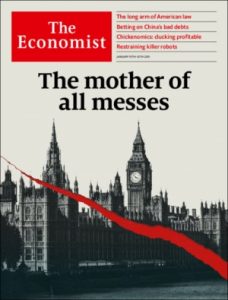 The recent edition of the Economist, a liberal weekly, devoted two pieces to the phenomenon of extraterritoriality, that is application of domestic rules beyond the country’s shores. See
The recent edition of the Economist, a liberal weekly, devoted two pieces to the phenomenon of extraterritoriality, that is application of domestic rules beyond the country’s shores. See 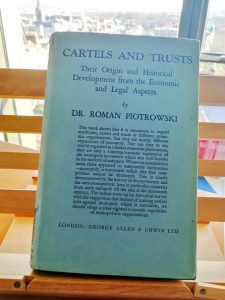 As the new semester approaches I was wondering whether I should assign a reading from what is one of the first books comparatively exploring competition law and the one doing so from the legal and economic perspectives– namely
As the new semester approaches I was wondering whether I should assign a reading from what is one of the first books comparatively exploring competition law and the one doing so from the legal and economic perspectives– namely 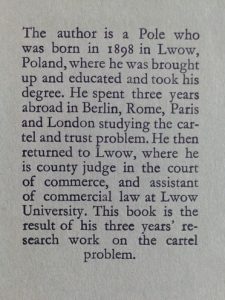
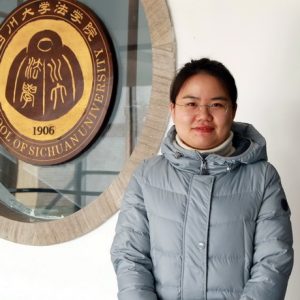 We are delighted to let you know that Dr Yichen Yang, Lecturer in Law at the Sichuan University (China) accepted our invitation. Dr Yang will make a guest appearance in the Spring. She will outline the operation and functioning of the competition law system in the People’s Republic of China.
We are delighted to let you know that Dr Yichen Yang, Lecturer in Law at the Sichuan University (China) accepted our invitation. Dr Yang will make a guest appearance in the Spring. She will outline the operation and functioning of the competition law system in the People’s Republic of China.